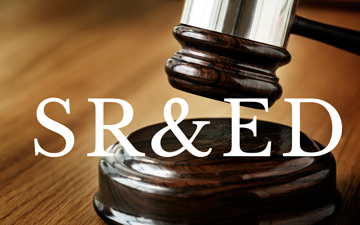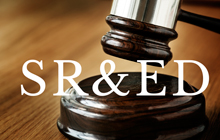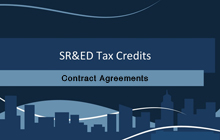SR&ED: The CRA cannot use its civil tax audit power to gather information for a criminal investigation

David J Rotfleisch explains why the Federal Court of Appeal ruled in favour of the CRA in a Scientific Research and Experimental Development tax credits case
Editor's Note: for more on this case, see Suing the Canada Revenue Agency for negligence, by David J. Rotfleisch, from April 2020.
 |
David J Rotfleisch, CPA, JD is the founding tax lawyer of Taxpage.com and Rotfleisch & Samulovitch P.C., a Toronto-based boutique tax law corporate law firm. |
The CRA must respect the taxpayer's Charter rights in its criminal investigation
In Gordon v Canada, the taxpayers operated a corporation that submitted Scientific Research and Experimental Development (SR&ED) tax credit claims on behalf of their clients for a contingency fee. The Canada Revenue Agency (CRA) initially conducted several tax audits into these SR&ED claims and launched a criminal investigation in 1995. The investigation resulted in the indictment and prosecution of the taxpayers for several criminal charges. Although the preliminary hearing on these charges occurred over almost four years, the proceedings were stayed in September 2004. The taxpayers then instituted proceedings before the Federal Court in March 2006, seeking damages based on negligence investigation, breach of their Charter rights, malicious prosecution, etc.
The Federal Court found that the taxpayers used certain methods that involved the creation of a shell corporation and backdated contractors for the SR&ED claims. Therefore, the Federal Court dismissed the taxpayer's actions because it found these methods amounted to misrepresentation, and the CRA's investigation was not carried out in a manner that could be characterized as negligent. The taxpayer then appealed to the Federal Court of Appeal (FCA). After a careful analysis, the Federal Court of Appeal ruled there was insufficient evidence to prove the taxpayers' claim of negligence and the CRA conducted its investigation diligently.
The Federal Court judge found there was support for the CRA's investigation
The Federal Court judge found that the CRA's investigation was focused on the taxpayers' use of backdating documents to claim SR&ED expenses purportedly incurred in previous years. Aside from the involvement of a shell corporation and backdated contracts, the judge found the wages of employees allegedly involved in the alleged SR&ED work were calculated according to the taxpayer's fair market value assessment of the laborers. Overall, the Federal Court judge found the taxpayers' methods used in various contexts and combinations were indefensible and amounted to misrepresentation. Although the CRA did owe the taxpayers a duty of care, the judge found ample support for the investigation as a whole.
The Federal Court of Appeal found no palpable and overriding errors in the federal court judge's assessment
The Canadian litigation tax lawyer acting for the taxpayers contended before the FCA that the CRA investigations didn't follow its Taxation Operations Manual, and the CRA tax auditors accepted certain methods they used to claim SR&ED tax credits. However, the FCA found the taxpayers had not met the burden to demonstrate that the CRA investigation was legally unsound or that the CRA officials acted unlawfully, maliciously or negligently in the conduct of the investigation.
Regarding the CRA internal manual, the FCA noted it was simply a set of guidelines with no binding legal effect. In addition, the FCA found the CRA's investigation was well documented, and there were few factual disagreements in the record. Furthermore, the Federal Court of Appeal found that the CRA never formally endorsed the taxpayers' methods used in the SR&ED claims. Overall, the FCA judge concluded there was insufficient evidence to prove the appellants' claim of negligence, and the CRA investigation was conducted diligently even though there were minor missteps.
Pro tax tips — the CRA must respect the taxpayer's Charter rights in its criminal investigation
To make an SR&ED claim, a taxpayer must keep accurate records related to the SR&ED projects and comply with normal accounting principles. A taxpayer should not only keep an electronic accounting ledger, but also all company financial statements, records, journals, vouchers, invoices and payroll records throughout the tax year will as the necessary proof that research activities were carried out utilizing the staff and equipment claimed.
The Income Tax Act grants the CRA the power to investigate criminal tax evasion or fraud, and Charter-protected rights will be triggered for taxpayers under such criminal investigations. If the CRA fails to follow the required criminal investigation procedure, it may lead to violation of taxpayer's Charter rights. However, the CRA cannot use its civil tax audit power to gather information for its criminal investigation.
David J Rotfleisch, CPA, JD is the founding tax lawyer of Taxpage.com and Rotfleisch & Samulovitch P.C., a Toronto-based boutique tax law corporate law firm and is a Certified Specialist in Taxation Law who has completed the CICA in-depth tax planning course. He appears regularly in print, radio and TV and blogs extensively.
With over 30 years of experience as both a lawyer and chartered professional accountant, he has helped start-up businesses, cryptocurrency traders, resident and non-resident business owners and corporations with their tax planning, with will and estate planning, voluntary disclosures and tax dispute resolution including tax audit representation and tax litigation. Visit www.Taxpage.com and email David at david@taxpage.com.
Read the original article on Taxpage.com. Title image: CRA signage courtesy Government of Canada. Author photo courtesy Rotfleisch & Samulovitch P.C.











(0) Comments